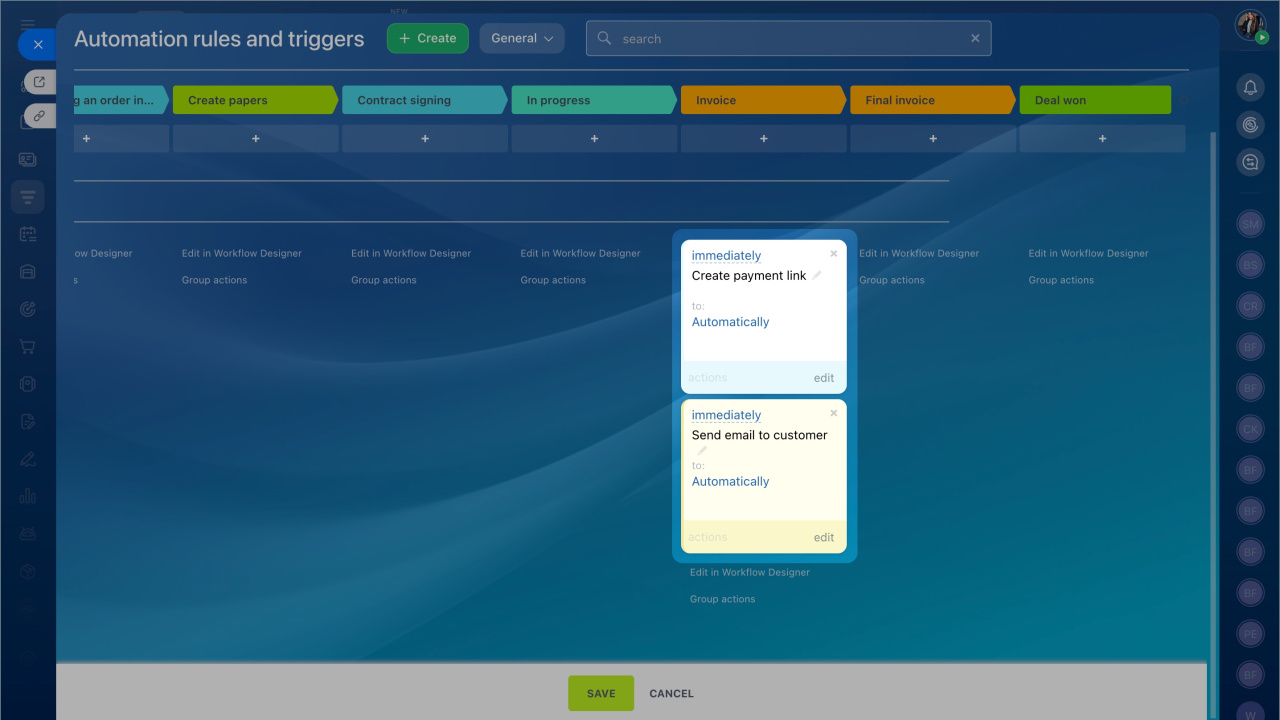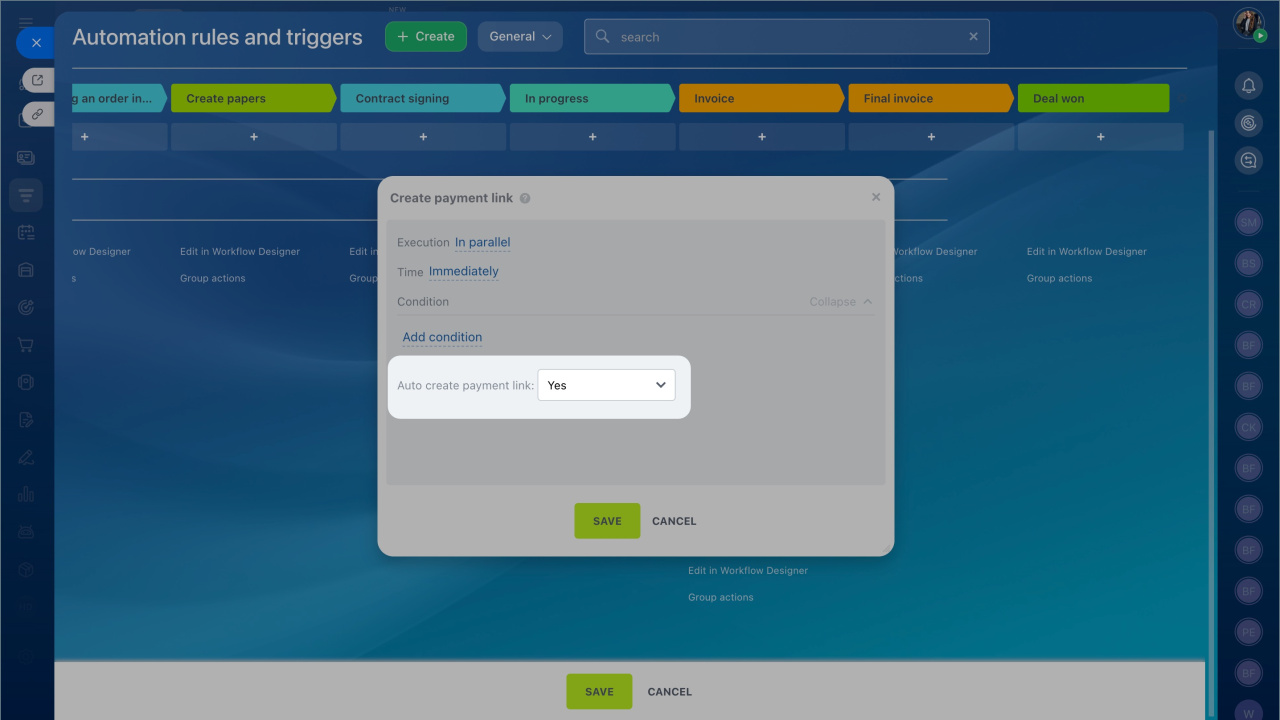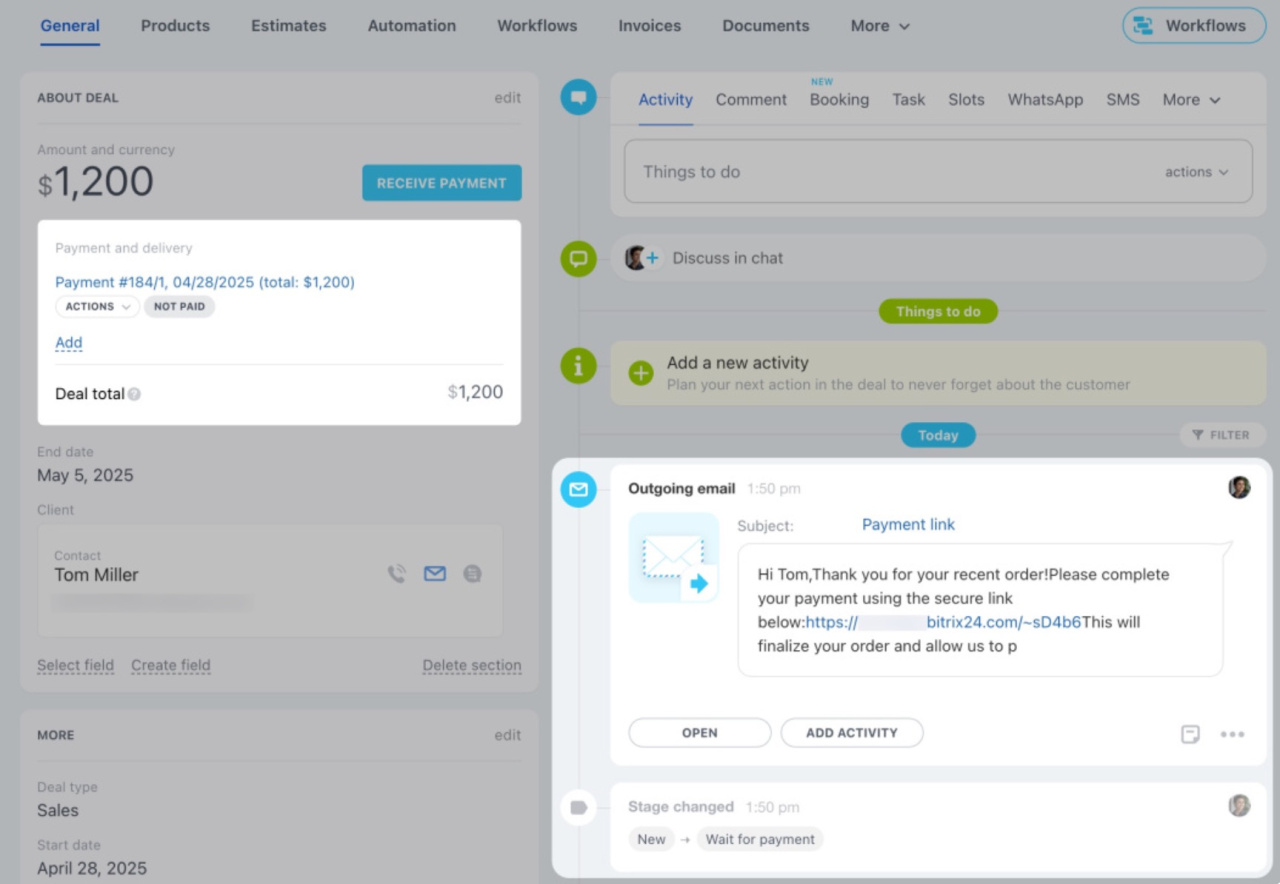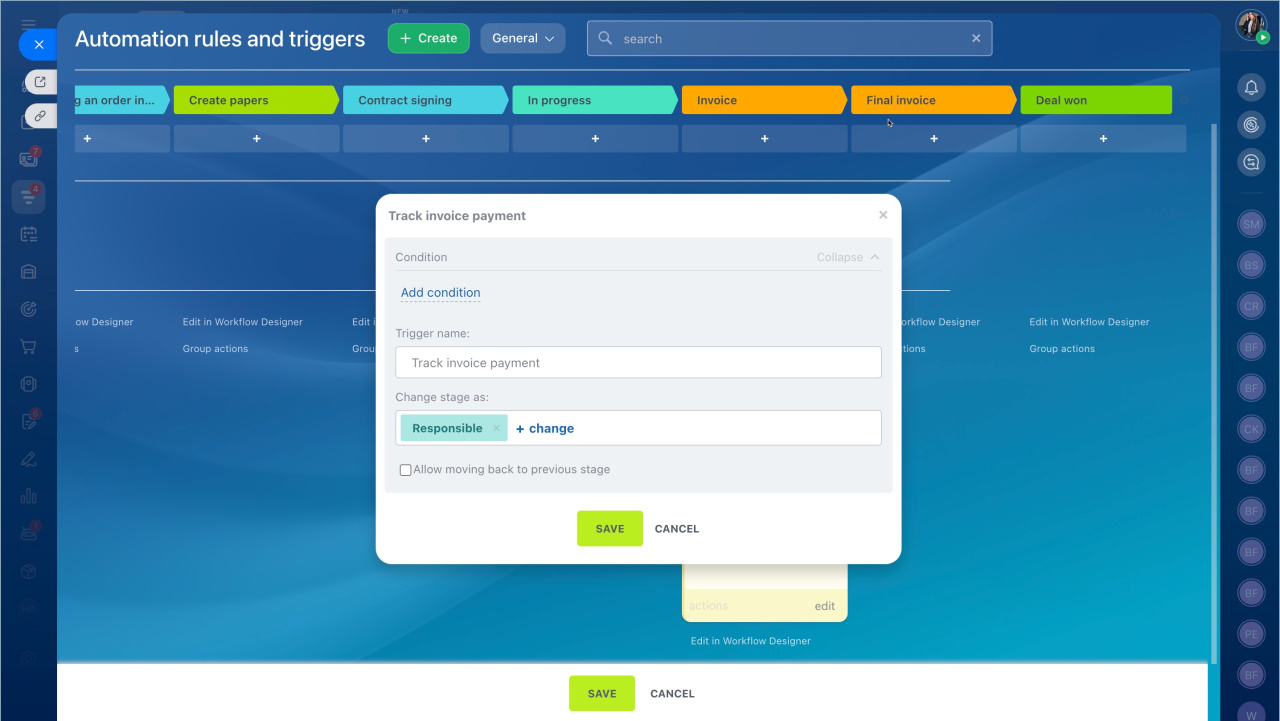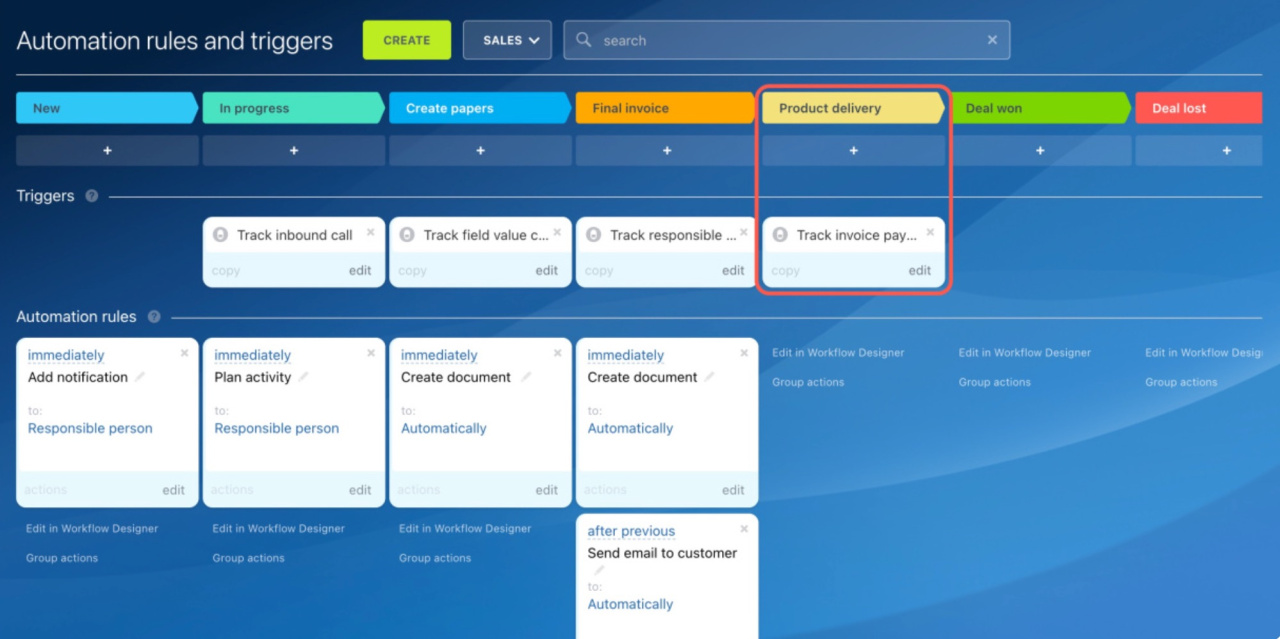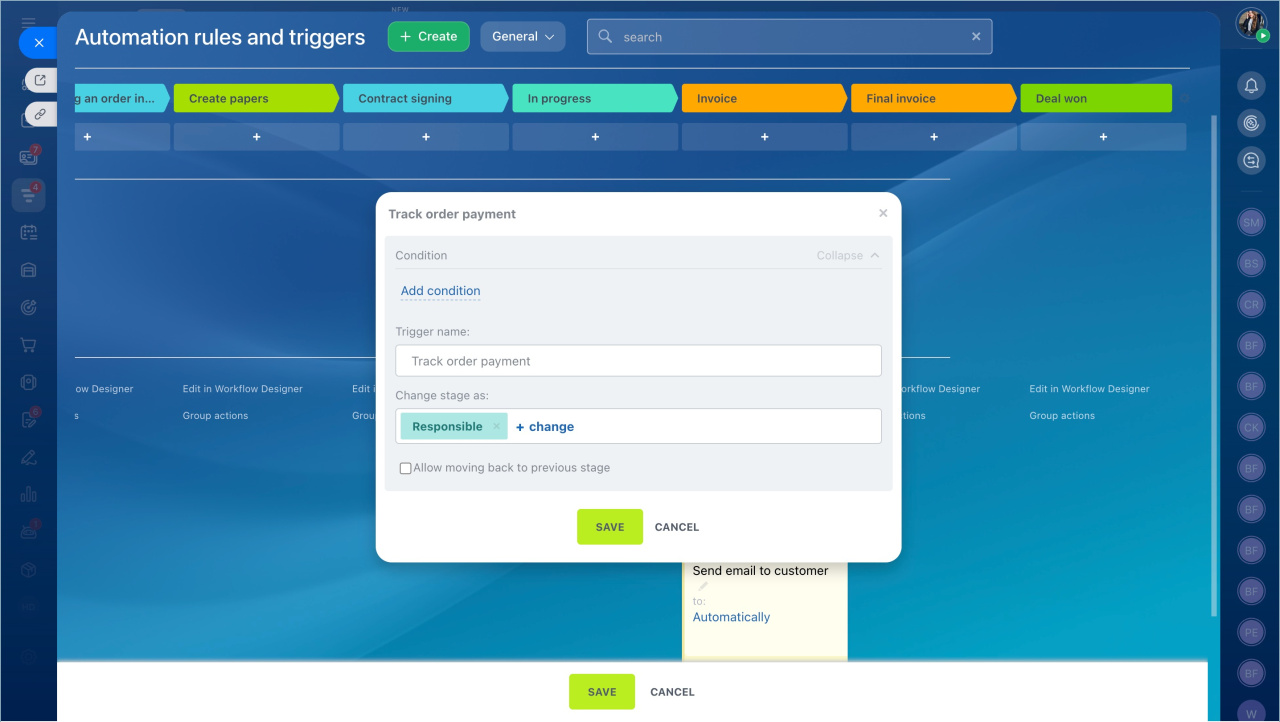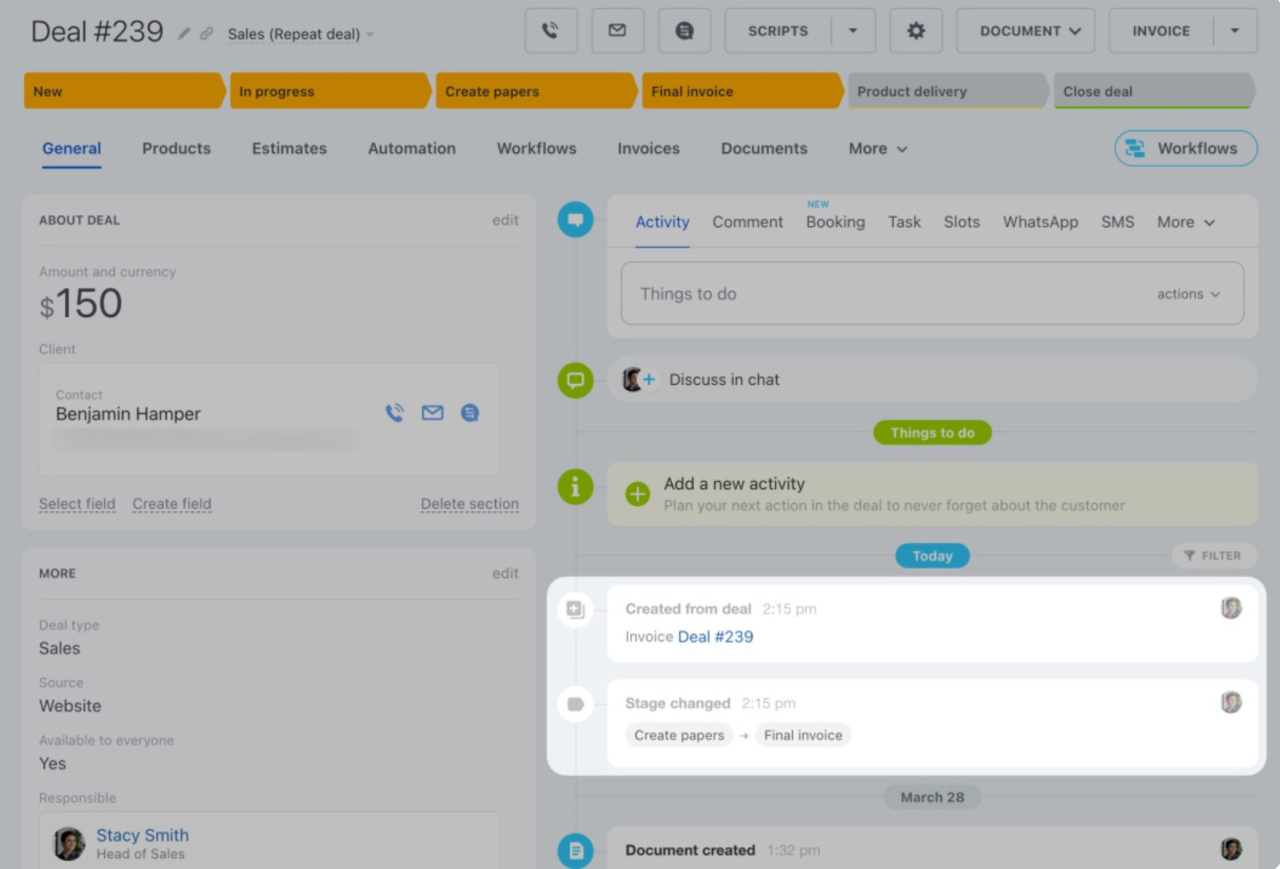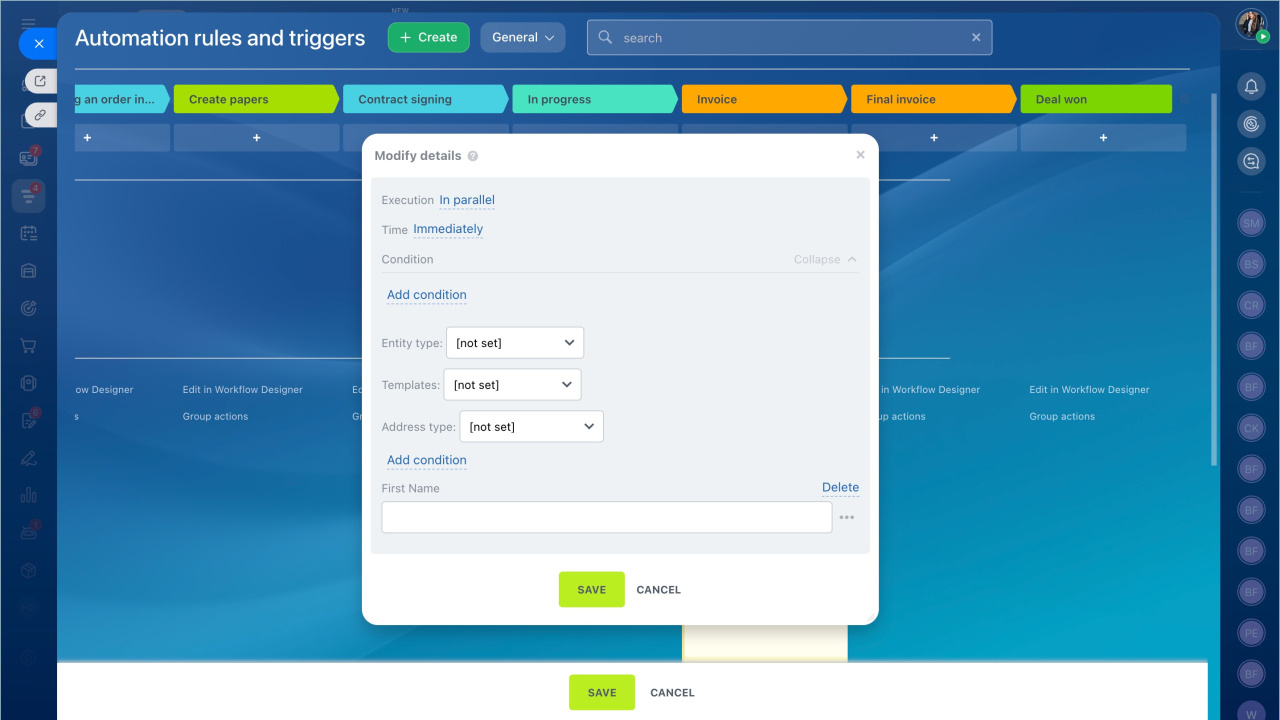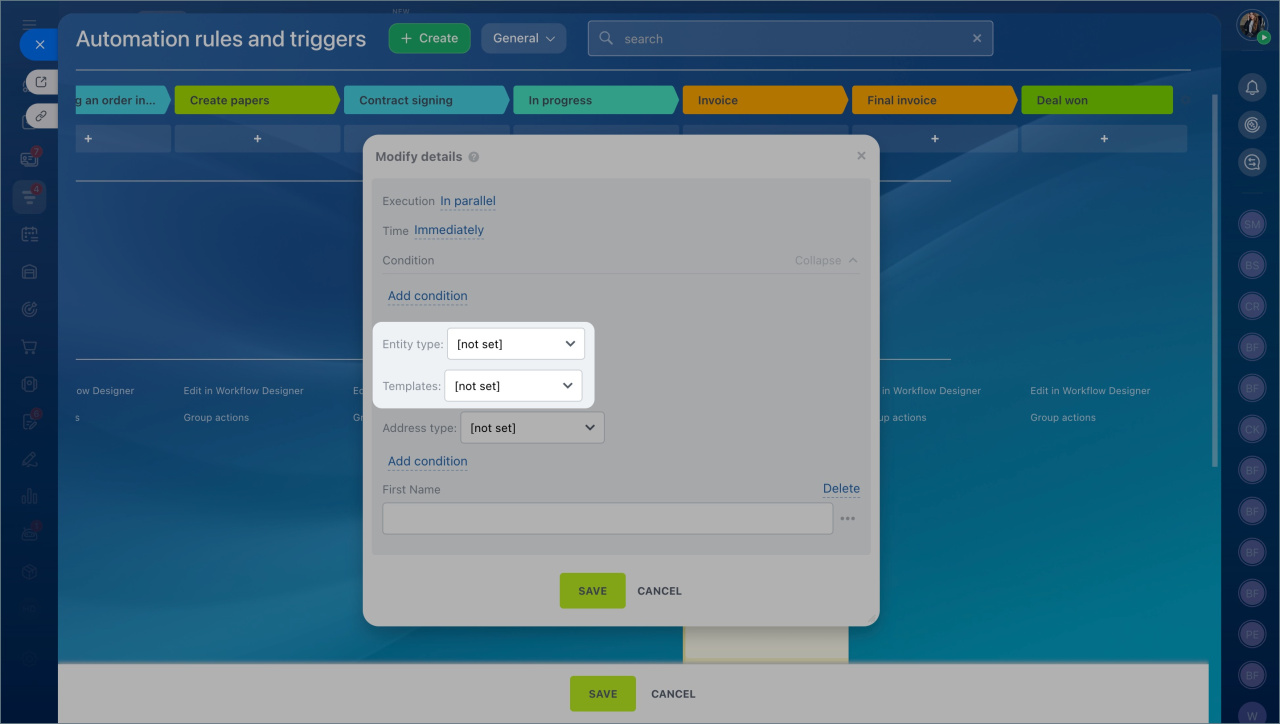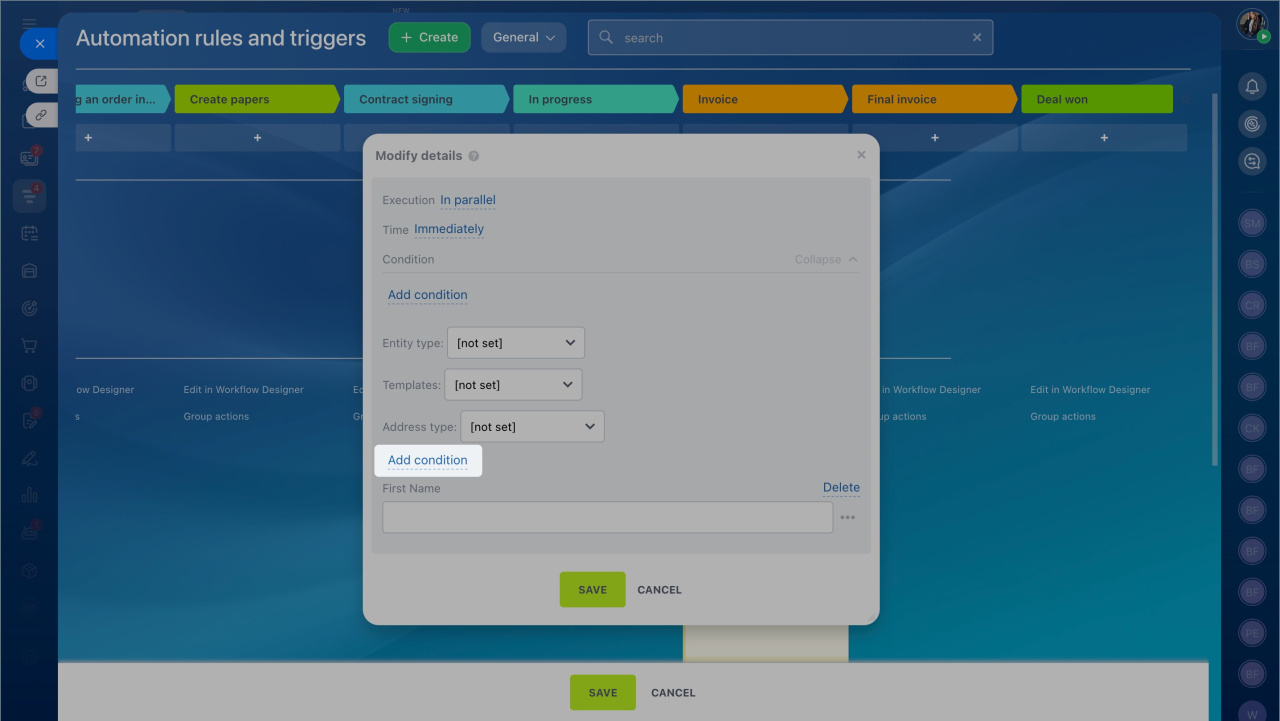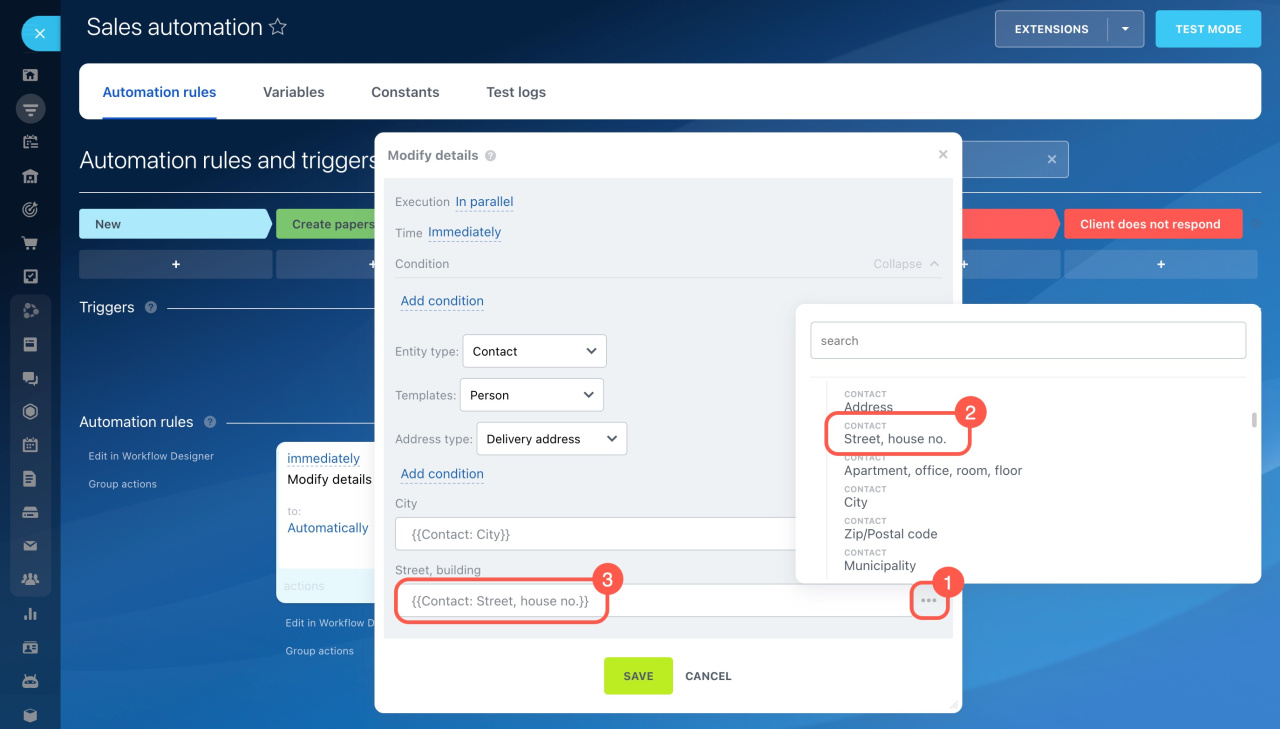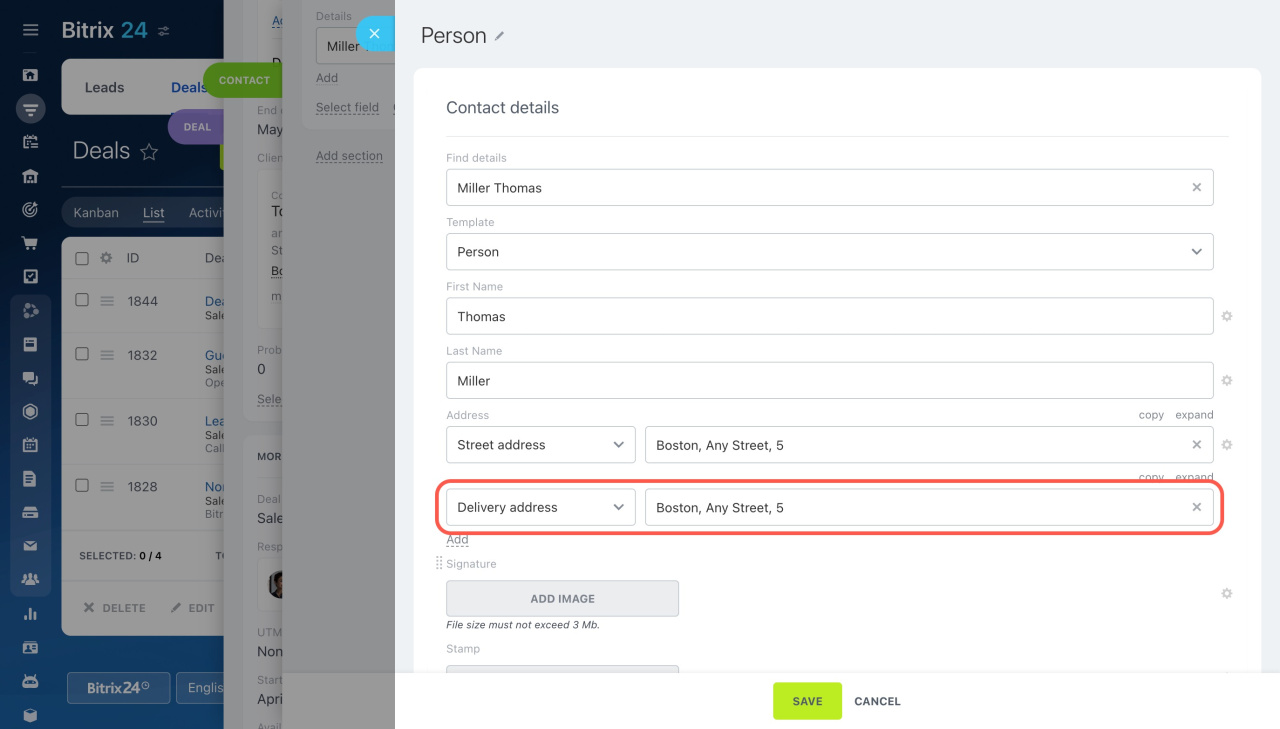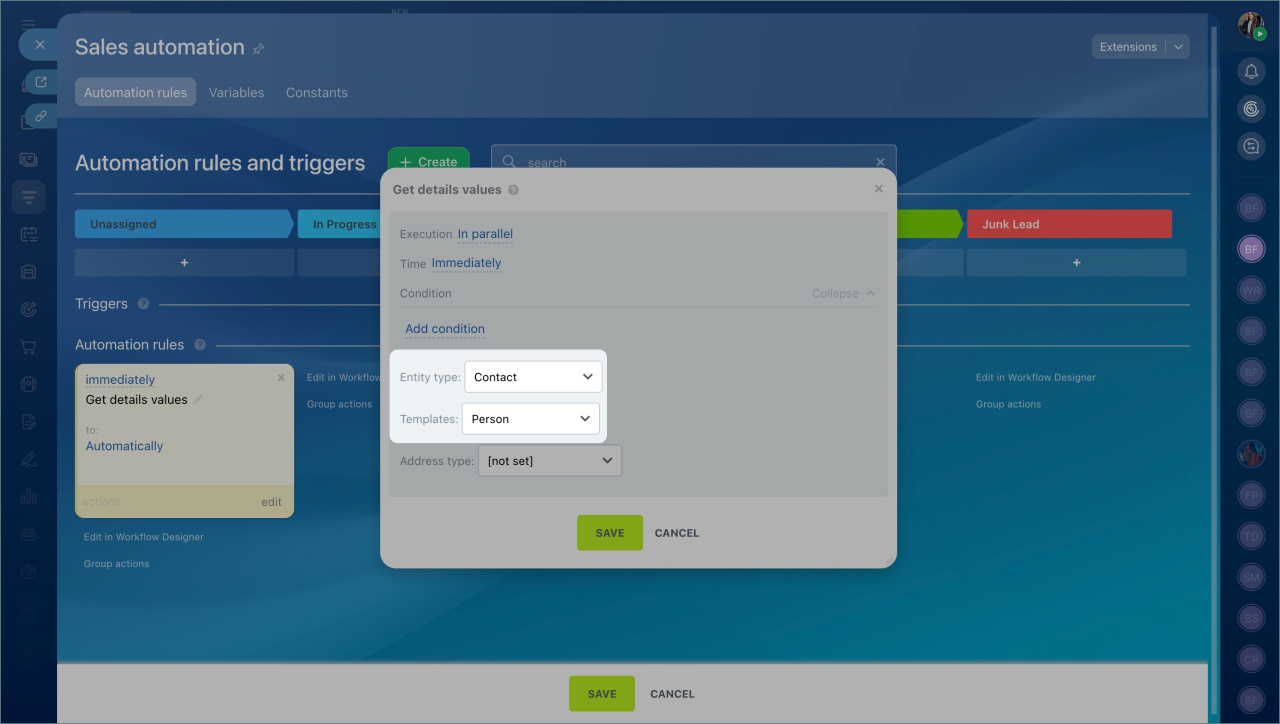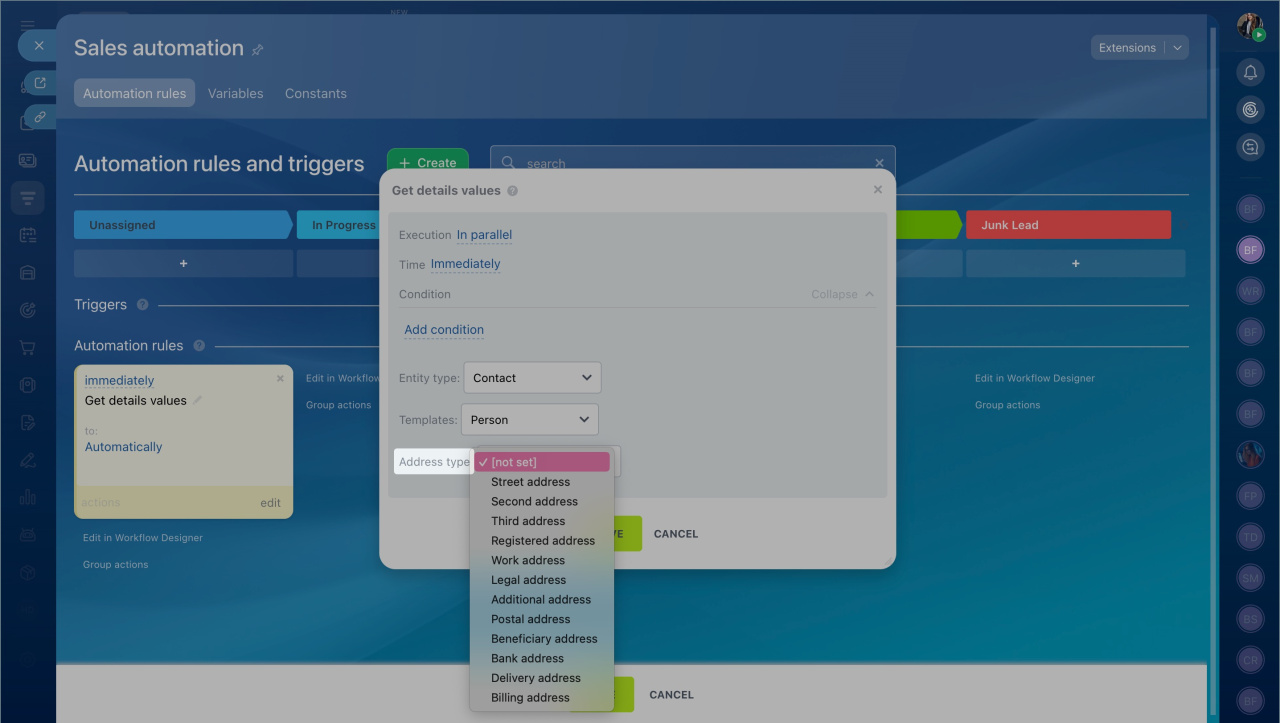Automation rules and triggers in CRM help automate customer interactions. Automation rules perform routine tasks, like sending emails, planning activities, and creating documents. Triggers track customer actions and changes in CRM, such as email link clicks, incoming calls, invoice payments, and more. When a specific action occurs, the trigger moves a CRM item to its designated stage.
Automation rules in CRM
Triggers in CRM
Automation rules and triggers are grouped by the tasks they solve. In this article, we focus on the Payment group:
- Create payment link
- Track invoice payment
- Track order payment
- Create using source
- Modify details
- Get details values
- Go to the CRM section.
- Select the item type, like Leads or Deals.
- Open the Automation rules tab.
- Click Create.
- Choose the stage where you want a rule or trigger to appear.
- Open the Payment group.
Create payment link
This is a helper automation rule that creates a link for online payment of products or services and passes it to other automation rules. The link contains payment data, such as the order amount and product information. For example, use this rule to create a payment link and set up another rule to email it to the customer.
Configure "Create payment link" automation rule
Add two rules for deals at the Wait for payment stage: Create payment link and Send email to customer. Once the first rule creates a payment link, the second will email it to the customer.
First, set up the Create payment link automation rule.
Auto create payment link. Choose Yes to create a link. If you are working with orders, select No and enter the order ID.
Then, configure the automation rule to send an email with the payment link. Ensure it's configured to run after the previous rule, so it waits for the link to be created.
When a deal moves to the Wait for payment stage, the first rule generates a link, and the second sends an email with the payment link.
Automation rules: Customer communication
Track invoice payment
The trigger updates the CRM item stage when the linked invoice is marked as Paid. The responsible person can be notified immediately to move on to the next steps, like packaging products for delivery or providing services.
Features of invoices in CRM
Configure "Track invoice payment" trigger
Add the trigger for deals at the Product delivery stage.
This trigger doesn't have any extra settings. Just complete the standard ones: set conditions, customize the name, choose whose name to use for the stage change, and decide if the item can move to previous stages.
When an invoice is paid, the trigger moves the linked deal to the Product delivery stage. The deal timeline shows the invoice status and the stage change record.
Track order payment
The trigger updates the CRM item stage when the customer pays via the link created using CRM Payment. The responsible person can be notified immediately to move on to the next steps, like packaging products for delivery or providing services.
Accept payment in the deal form
Configure "Track order payment" trigger
Add the trigger for deals at the Product delivery stage.
This trigger doesn't have any extra settings. Just complete the standard ones: set conditions, customize the name, choose whose name to use for the stage change, and decide if the item can move to previous stages.
When a payment is received, the trigger moves the deal to the Product delivery stage. The CRM item form shows the payment status and the stage change record.
Create using source
When a CRM item reaches a certain stage, the automation rule can create an invoice, estimate, or document in the e-Signature section. For example, create an invoice from a deal, and it will include the necessary data like products, amount, details, and more.
What is Bitrix24 e-Signature
Configure "Create using source" automation rule
Add the automation rule for deals at the Final invoice stage. When a deal moves to this stage, the rule will create an invoice from it.
Responsible person. Choose which employee will be responsible for the new item. By default, it is the person responsible for the source deal.
Create using source. Select which item the automation rule will create. You can choose one or multiple items.
When a deal moves to the Final invoice stage, the rule creates an invoice from this deal.
Modify details
The automation rule updates existing company or contact details linked to the CRM item. It can update information used in documents, such as VAT ID or legal address.
Configure "Modify details" automation rule
Add the automation rule for deals at the Create documents stage.
Entity type. Choose whether to change details for a contact or a company.
Templates. Specify the details template: company or person.
Contact or company details templates
Address type. Select the address type from the details: legal, street, or other.
Add condition. Choose the details fields you want to update. The available fields depend on the selected template. Click Add condition and choose a field from the list.
To specify a new field value, click the three dots (...) and choose a constant, variable, or field value from the CRM item form. These data will be displayed in the details.
When a deal moves to the Create papers stage, the automation rule changes the Address field value in the contact details.
Get details values
This is a helper automation rule that retrieves information from details fields and passes it to other automation rules. For example, use it to get data about the delivery address and set up another rule to send this info to the courier for product delivery.
Helper automation rules
Configure "Get details values" automation rule
Add two rules for deals at the Product delivery stage: Get details values and Add notification. When the first rule retrieves the customer's delivery address, the second will send it to the courier.
Here's how to set up the Get details values automation rule:
Entity type. Choose whether to get details for a contact or a company.
Templates. Specify the details template: company or person.
Address type. Select the address type: legal, street, or other.
When a deal moves to the Product delivery stage, the rule sends a notification with the address where the product should be sent.




